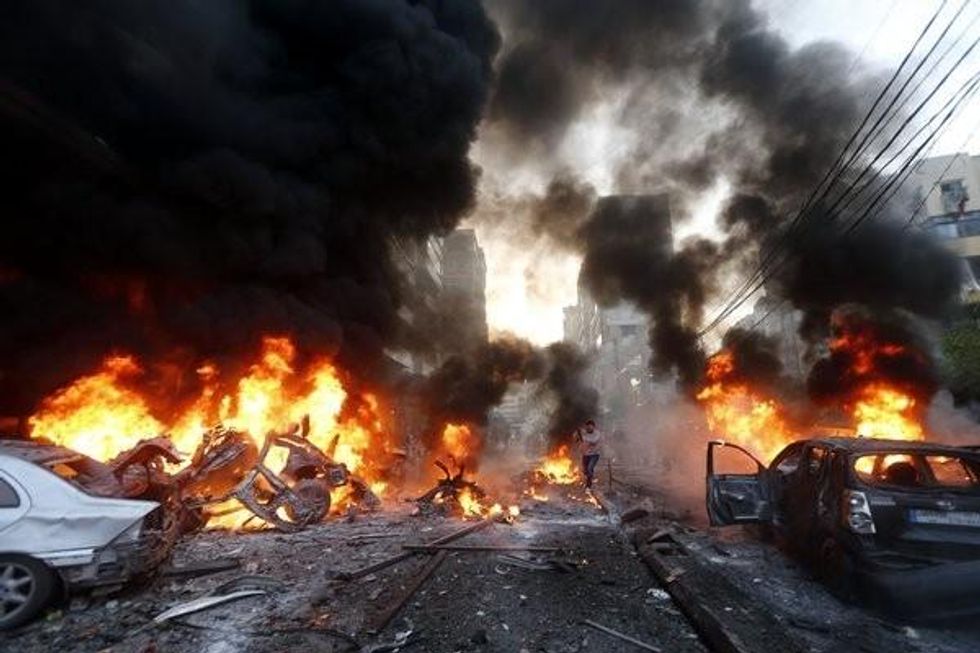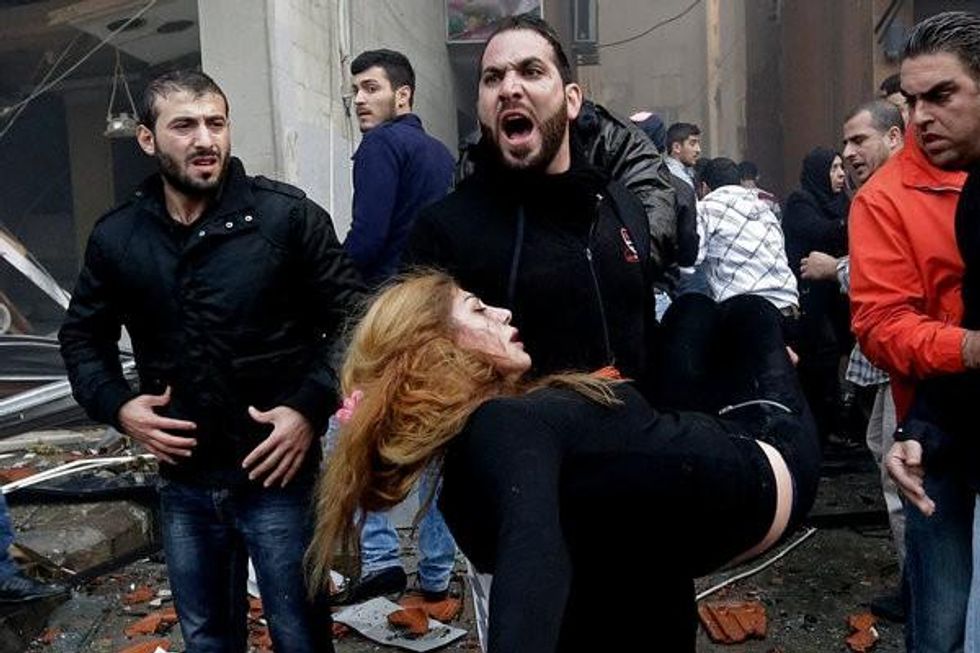

SUBSCRIBE TO OUR FREE NEWSLETTER
Daily news & progressive opinion—funded by the people, not the corporations—delivered straight to your inbox.
5
#000000
#FFFFFF
To donate by check, phone, or other method, see our More Ways to Give page.


Daily news & progressive opinion—funded by the people, not the corporations—delivered straight to your inbox.

The blast took place in the Haret Hreik district of the suburb Dahiyeh -- a majority Shi'a neighborhood. The explosion destroyed multiple cars and left wreckage strewn throughout the street, releasing a thick plume of smoke, according to multiple media reports.
"Suddenly, the whole area went bright and we started running away," Ali Oleik, an accountant who works in a nearby office building, told The Associated Press. "I saw two bodies on the street, one of a woman and another of a man on a motorcycle who was totally deformed."
The bombing comes less than a week after an explosion in downtown Beirut killed prominent Sunni politician Mohammed Chatah and at least five other people. Thursday's bombing was the fifth such attack on Shi'a civilians in Lebanon in the past six months. Deadly attacks on Sunni civilians have also shaken Lebanon, including two blasts outside of Sunni mosques in August that killed more than 40 people.
Initial reporting from major U.S. media outlets, including The New York Times (which later changed its headline) described the bombing as an attack on a Hizbullah "neighborhood."
Yet, Lebanese writer and activist Rami El-Amine told Common Dreams, "There's no such thing as a Hizbullah neighborhood. You can't target Hizbullah this way. They don't exist above ground. This was a sectarian attack targeting Shi'a. It is just like any other attack targeting innocent civilians."
"It's incredible that they [The New York Times] can dehumanize even an event so incapable of being dehumanized-- the killing of innocents," he said.

_____________________
Dear Common Dreams reader, The U.S. is on a fast track to authoritarianism like nothing I've ever seen. Meanwhile, corporate news outlets are utterly capitulating to Trump, twisting their coverage to avoid drawing his ire while lining up to stuff cash in his pockets. That's why I believe that Common Dreams is doing the best and most consequential reporting that we've ever done. Our small but mighty team is a progressive reporting powerhouse, covering the news every day that the corporate media never will. Our mission has always been simple: To inform. To inspire. And to ignite change for the common good. Now here's the key piece that I want all our readers to understand: None of this would be possible without your financial support. That's not just some fundraising cliche. It's the absolute and literal truth. We don't accept corporate advertising and never will. We don't have a paywall because we don't think people should be blocked from critical news based on their ability to pay. Everything we do is funded by the donations of readers like you. Will you donate now to help power the nonprofit, independent reporting of Common Dreams? Thank you for being a vital member of our community. Together, we can keep independent journalism alive when it’s needed most. - Craig Brown, Co-founder |

The blast took place in the Haret Hreik district of the suburb Dahiyeh -- a majority Shi'a neighborhood. The explosion destroyed multiple cars and left wreckage strewn throughout the street, releasing a thick plume of smoke, according to multiple media reports.
"Suddenly, the whole area went bright and we started running away," Ali Oleik, an accountant who works in a nearby office building, told The Associated Press. "I saw two bodies on the street, one of a woman and another of a man on a motorcycle who was totally deformed."
The bombing comes less than a week after an explosion in downtown Beirut killed prominent Sunni politician Mohammed Chatah and at least five other people. Thursday's bombing was the fifth such attack on Shi'a civilians in Lebanon in the past six months. Deadly attacks on Sunni civilians have also shaken Lebanon, including two blasts outside of Sunni mosques in August that killed more than 40 people.
Initial reporting from major U.S. media outlets, including The New York Times (which later changed its headline) described the bombing as an attack on a Hizbullah "neighborhood."
Yet, Lebanese writer and activist Rami El-Amine told Common Dreams, "There's no such thing as a Hizbullah neighborhood. You can't target Hizbullah this way. They don't exist above ground. This was a sectarian attack targeting Shi'a. It is just like any other attack targeting innocent civilians."
"It's incredible that they [The New York Times] can dehumanize even an event so incapable of being dehumanized-- the killing of innocents," he said.

_____________________

The blast took place in the Haret Hreik district of the suburb Dahiyeh -- a majority Shi'a neighborhood. The explosion destroyed multiple cars and left wreckage strewn throughout the street, releasing a thick plume of smoke, according to multiple media reports.
"Suddenly, the whole area went bright and we started running away," Ali Oleik, an accountant who works in a nearby office building, told The Associated Press. "I saw two bodies on the street, one of a woman and another of a man on a motorcycle who was totally deformed."
The bombing comes less than a week after an explosion in downtown Beirut killed prominent Sunni politician Mohammed Chatah and at least five other people. Thursday's bombing was the fifth such attack on Shi'a civilians in Lebanon in the past six months. Deadly attacks on Sunni civilians have also shaken Lebanon, including two blasts outside of Sunni mosques in August that killed more than 40 people.
Initial reporting from major U.S. media outlets, including The New York Times (which later changed its headline) described the bombing as an attack on a Hizbullah "neighborhood."
Yet, Lebanese writer and activist Rami El-Amine told Common Dreams, "There's no such thing as a Hizbullah neighborhood. You can't target Hizbullah this way. They don't exist above ground. This was a sectarian attack targeting Shi'a. It is just like any other attack targeting innocent civilians."
"It's incredible that they [The New York Times] can dehumanize even an event so incapable of being dehumanized-- the killing of innocents," he said.

_____________________